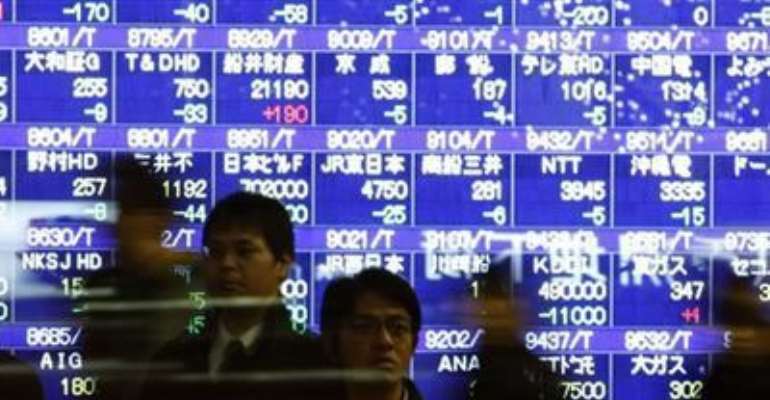Greece Wrangling Tempers Market Momentum; RBA Holds Rates

Greek resistance to the strict conditions attached to a bailout fund on Tuesday sapped recent momentum in markets spurred by hopes the global economy is improving, and the euro fell on renewed fears of a messy debt default.
The Australian dollar leapt to a six-month high but stocks turned negative after the central bank held rates steady at a review when markets had positioned for a rate cut.
Opinions were divided over whether the wrangling over Greece's debt restructuring talks would eventually be resolved or trigger contagion across other vulnerable euro zone countries, tempering risk-taking investments.
MSCI's broadest index of Asia-Pacific shares outside Japan rose as much as 0.4 percent to its highest since September 1, then reversed direction, and last stood barely changed.
Australian shares were among the big losers, ending down 0.5 percent -- having been up before the central bank's afternoon decision to hold rates steady.
Financial spreadbetters expected Britain's FTSE 100, Germany's DAX and France's CAC-40 to open flat.
Japan's Nikkei average ended down 0.1 percent, slipping from a three-month high just shy of 9,000 hit on Monday.
"Concerns over the Greece issue are limiting real risk taking from investors, even if the environment generally appears to be improving," said Tetsu Emori, a fund manager with Astramax Co. in Tokyo.
"I'd expect all concerned parties to eventually strike a deal because it is in nobody's interest if Greece defaults. But a further delay in the debt talks will really hamper sentiment," he said.
After resisting terms of a proposed new bailout deal which demands strict labor reforms and other austerity steps, Greek political leaders face crunch talks on Tuesday to clinch an agreement needed to avoid a debt default.
The full package must be approved by the euro zone, the European Central Bank and the International Monetary Fund before February 15 in order to complete legal procedures for a bond swap deal for a March 20 bond redemption.
Moreover, some euro zone countries require parliamentary approval to raise the bailout money.
RATE DIFFERENCES
The euro eased 0.2 percent to $1.3107, although it had recovered from an overnight low of $1.3026.
The single currency hit a new record low against the Australian dollar near A$1.2140, as wide interest rate differentials made the Aussie more attractive than the struggling euro.
The Australian dollar jumped more than one cent to a six-month high of $1.0812 after the Reserve Bank of Australia unexpectedly kept interest rates steady at 4.25 percent, although it kept the door open to an easing if conditions deteriorated.
"In the absence of a messy Greek default, there is nothing really at the moment that's going to stop the Aussie from going and testing all-time highs," said David Scutt, a trader at Arab Bank Australia. It hit a 30-year peak of $1.1081 in July.
The dollar was up 0.3 percent against the yen at 76.72. Data from Japan's Finance Ministry on Tuesday confirmed that Tokyo conducted stealth foreign exchange intervention in October-December, even after a massive intervention on October 31 when the yen hit a record high around 75.31.
Commodities retreated with the dollar's gain against a basket of major currencies.
U.S. crude futures eased after rising above $97 a barrel, while Brent slipped after trading above $116 a barrel.
Spot gold was up 0.1 percent to $1,722 an ounce, trimming gains made earlier on an initial modest rise in equities.
Asian credit markets remained subdued, with the spreads on the iTraxx Asia ex-Japan investment grade index little changed, after tightening sharply on Monday.
The ECB's generous funding in December and expectations ahead of another such liquidity operation scheduled on February 29 sent three-month Euribor rates, a main gauge of unsecured interbank euro lending, to 1.094 percent on Monday, the lowest level in nearly a year.
Analysts expect consolidation in several equity markets which have recently climbed to near resistance levels, which may then pave the way for a break higher.
India's main 30-share BSE index is expected to find
major resistance at an October peak of 17,908, after rising as high as 17,829 on Monday.
Shanghai shares fell below a key support of 2,300 on Tuesday. A fall below 2,240-50 will reset the downtrend, while a break above 2,360 points to an eventual move higher.
REUTERS
